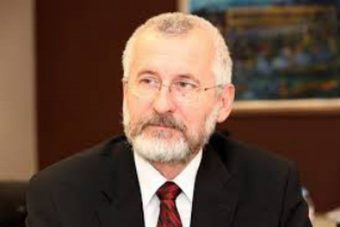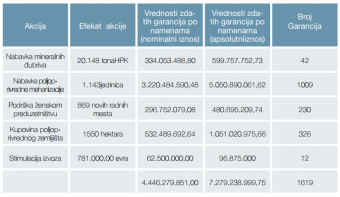
The Guarantee fund of Autonomous Province of Vojvodina was founded on 18 December 2003. and since then has provided a credit line from banks by concluding agreements on business cooperation with those financial institutions that are willing to support the program activities of the Fund and the conditions of crediting. In addition, this institution actively seeks to educate and inform the public about renewable energy sources and the benefits that they bring. That is why they organized an international conference ‘Promoting renewable energy sources: biomass in agriculture’ held on 12 May, 2015 in Novi Sad as a part of Novi Sad Agricultural Fair. For a special edition RENEWABLE ENERGY SOURCES, we talked to Mr. Goran Vasić, the Director of the Guarantee Fund of AP Vojvodina, about the results and efforts that this institution invests in the change. At the time of this interview, there was a competition for energy efficient equipment necessary for the use of renewable energy sources, and it relates exclusively to the territory of Vojvodina.
EP: The Guarantee fund of AP Vojvodina provides guarantees for loans granted for financing the procurement of energy efficient equipment and equipment necessary for the use of renewable energy sources. What exactly does your institution support and in what way?
Goran Vasić: The Guarantee Fund of Autonomous Province of Vojvodina was established on 18 December 2003 by the decision of the Assembly of AP Vojvodina. The Fund is registered in the Register of Funds on 15 April 2004 and on that day it gained a legal status. The mission of the fund is to provide easier access to financial markets and favourable credit conditions (lower interest rates, longer loan repayment periods, longer grace period) for farmers, micro, small and medium-sized companies, cooperatives and entrepreneurs from the territory of AP Vojvodina, by issuing guarantees as means to reduce the risks of commercial banks. The vision of the Fund is continuous development into a stable, competent and reliable financial organization that tends to reconcile its business rules with the business practices of similar institutions in the European Union. The main objectives of granting guarantees are encouraging: increase in employment, export, competitiveness, the development of areas and branches that have an impact on changes in economic structure, that is the optimal use of corporative advantages of AP Vojvodina, more dynamic and balanced regional development of AP Vojvodina, the reduction of the level of effective interest rates on loans. We operate so that we conclude an agreement on business cooperation with the banks that are willing to provide their credit lines to support program activities of the Fund and to adapt credit conditions (interest rate, term and method of loan repayment) to those that are defined in the work program of the Fund and in the competitions that the Fund announces for granting guarantees for providing loans designed for financing certain economic activities.

EP: In what amount have the projects in the field of EE and RES been supported? What is their development like? Could you please describe, in detail in terms of time and purpose, what has been realized so far?
Goran Vasić: On this occasion, I present to you a summary of total competitive activities for the period 2005 – 2015. It is a table which shows issued guarantees according to their purpose.
EP: Do you cooperate with funds from the EU and which funds are those? Do you exclusively support the project in Vojvodina? Tell us something more about that international cooperation and development plan of the Guarantee Fund of AP Vojvodina in the future.
Goran Vasić: In 2015 the Guarantee Fund of AP Vojvodina continued, previously established cooperation with the European Association of Mutual European Guarantee Societies – AECM, founded in 1992 in Brussels and today has 40 members. Most of them are member states of the European Union. But there is also Russia, Turkey and Montenegro. The Associations gathers private guarantee schemes, public institutions, guarantee funds and development banks. All these institutions have a mutual main goal to support small and medium enterprises and entrepreneurs, who have good projects, but do not have adequate provided funds for their financing by commercial banks. In addition to promoting instrument to support SMEs by providing guarantees, The Association of Guarantee Funds represents the interests of its members in the European Commission. The Fund submitted an application for membership in 2015 and became a member of this Association. As a member of this Association, the Fund will be recognized in the European Union, and the most important benefits will be the possibility to exchange
information and experiences with Association members from other countries and easier providing and withdrawal of funds from the European Union. Among others, Associate members are: Austrian AWS, Croatian HAMAG, Turkish „Teskomb”, Bulgarian national guarantee fund NGF and German VDB. The table shows the level of the guarantee portfolio and the number of guarantees issued in 2014 for stated members of The European Association of guarantee institutions.

Within the Association there are guarantee institutions whose target is supporting energy efficiency and renewable energy projects. They are predominantly located in Germany and our intention is to establish cooperation and thus create conditions for knowledge transfer and implementation of good practices. Special attention will be given to projects of energy rehabilitation of buildings with the collective housing with a large number of apartments where you have problems with coordinating and guaranteeing investments. Particularly interesting are the cases when due to the lack of will or the financial means of several apartment owners, planned investments of dozen of owners, who are ready and willing to undertake the investment, come to a halt. Guarantee fund started in August 2014 a project entitled “Promotion of renewable sources: biomass use by farmers in Vojvodina” which is jointly funded by the Heinrich Boll Foundation and the Fund, according to the Partnership agreement for the implementation of this project that the Fund concluded with the Heinrich Boll Foundation. The project objectives are fully coordinated with the priorities established by the Work program of the Fund. The Project’s overall goal is the promotion of production and use of biomass in agricultural production in AP Vojvodina, which will enable building trust and informing farmers in Vojvodina about the use of agricultural biomass as energy source, development and promotion of financial instruments for the production and use of biomass from agricultural production and increased use of renewable energy sources. As a result of this project a publication “Promoting the application of biomass in small and medium-sized farms in Vojvodina” was created and promoted in May 2015 during the International Agricultural Fair. On that occasion an international conference was organized and dedicated credit line was promoted, which was supported by the following banks: AIK bank, Banca Intesa, Credit Agricole, Hypo Alpe Adria, Komercijalna bank, ProCredit.
THE LIST OF AREAS THAT WILL BE CREDITED IN THE FUTURE
1. Buildings:
Replacement of the heating system: Replacing old heating systems with modern systems and conventional boilers for central heating with modern and more efficient condensing boilers. Replacement of the cooling system: Cooling space involves the purchase of coolers – new compressors with 8 cm of thermal insulation without Freon R-22. Insulation of external walls and roofs. This means that the exterior walls and ceilings are without any external insulation. Measures must contain the installation of appropriate materials for thermal insulation materials (for example, styrodur, and mineral wool) and that the thickness is in accordance with the standards of energy efficiency. Replacement of external windows. This includes windows with a single glaze/ non-insulated windows or old windows with double-glazed windows. Windows with single glazing or old double-glazed windows must be replaced with double-glazed windows with modern thermal – insulated glazing as a minimum standard for windows. Replacement of external doors. External doors that are not thermally insulated have to be replaced with the modern preinsulated door. Replacement of unregulated heating pumps for central heating with new, electronically controlled pumps. The existing built-in pumps of hot water heating systems operate without electronic control. It is necessary to replace them with pumps with electronic regulation.
2. The use of renewable energy sources:
Solar thermal systems for domestic hot water. The installation of new solar thermal system for preparation of domestic hot water, with flat collectors. Maximum collector area is 50 m2. Replacement of conventional heat production system with electric heat pumps with heat sources which can be soil, water or air. The installation of a network photovoltaic system. The installation of new photovoltaic system with solar PV panels. The system has to be connected to the grid.
3. Lighting:
Replacement of incandescent (classic) bulbs with new CFL bulbs. Space is illuminated with classical incandescent bulbs, which should be replaced with modern CFL bulbs. Replacement of old fluorescent lamps with modern T5 lamps with electronic ballast. According to the current situation, space is illuminated with older fluorescent lamps (T8 or T12) with electromagnetic ballast. Those fluorescent lamps should be replaced with modern fluorescent lamps (T5) with electronic ballast. Usually, it is necessary to replace the lamps together with lighting elements.
4. Agricultural equipment:
New agricultural machinery (tractors, harvester) with Tier III or Euro 3A engine as well as multifunctional machines with a minimum of three functions. Agricultural tools. Agricultural tools which can be financed are those that reduce energy consumption during field works with improved treatment systems (reduced tillage, protective treatment, processing into strips) and sowing (direct sowing in furrows and direct sowing in holes). Heat recovery in dairies. This measure includes the installation of heat recovery system for dairies. The heat from the extracted milk will be used during the cooling process for pre-heating of lukewarm and warm water. Installation of a simple heat exchanger and installation of the heat exchanger with an additional condenser of the cooling system can be financed. The new harvester with Tier III or Euro 3A engine. Replacement of the irrigation system. Procurement of new irrigation systems with the pump driven by energy efficient engine.
Interview by: Vesna Vukajlović
This interview was originally published in the Bulletin of Energy Portal “Renewable Energy”, on June 1, 2016.



